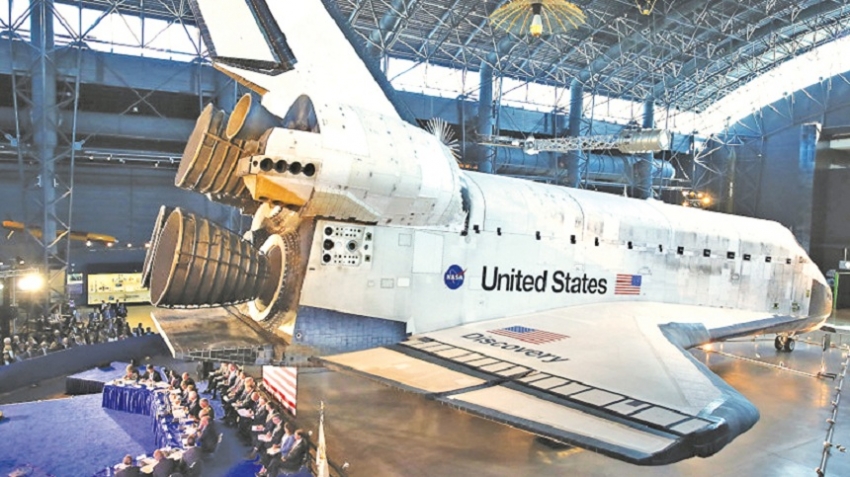Getting off this planet is more important than hypothetical Martian bacteria.The entrepreneur Elon Musk’s Martian ambitions are coming into clearer focus with each gleaming steel panel welded onto the two early spaceship prototypes under construction. While standing in front of a Starship Mark 1 last month, he reiterated his commitment to “making humanity multiplanetary” by founding a city on Mars. For Musk, Jeff Bezos, and other space visionaries, the solar system is filled with nearly unlimited natural resources that will relieve pressure on the Earth’s fragile environment, grow the U.S. economy exponentially, and propel humanity toward its destiny in the stars.
Yet, Musk’s shining city on Mars and Bezos’s lunar ice mines are not universally celebrated. There is a group in the space community who view the solar system not as an opportunity to expand human potential but as a nature preserve, forever the provenance of an elite group of scientists and their sanitary robotic probes. These planetary protection advocates such as Monica Grady demand the strictest interpretation of the 1967 Outer Space Treaty, which calls for avoiding “harmful contamination” of celestial bodies. Under this regime, NASA incurs great expense sterilizing robotic probes in order to prevent the contamination of entirely theoretical biospheres.
A decorated Army officer says the U.S. president acted improperly in demanding politically motivated investigations.
These draconian requirements are incompatible with Musk’s city and NASA’s human exploration plans. Astronauts can’t survive without their own personal skin and gut symbiotes.
Transporting bacteria would matter if Mars were the vital world once imagined by astronomers who mistook optical illusions for canals. Nobody wants to expose Martians to measles, but sadly, robotic exploration reveals a bleak, rusted landscape, lacking oxygen and flooded with radiation ready to sterilize any Earthly microbes.
Solar system
Simple life might exist underground, or down at the bottom of a deep canyon, but it has been very hard to find with robots. Discovering that life would be a marvelous boon for science—but to step as carefully as a Jain monk sweeping insects from his path endangers the entire space programme, especially when the existence of Martian life remains hypothetical. The upsides from human exploration and development of Mars clearly outweigh the welfare of purely speculative Martian fungi.
Fortunately, this conflict with potential life is unnecessary elsewhere in the solar system. The moons Enceladus and Europa may harbour life in seas hidden beneath their icy crusts, but they are not near-term targets for human development or settlement. To echo Arthur C. Clarke’s injunction in 2010: Odyssey Two, all these worlds are the appropriate domain of the astrobiologists, and we must attempt no landing there without care—and NASA is on top of that. The proposed Europa lander will thermally self-destruct after completing its investigation.
The other likely targets of human exploration, development, and settlement, our moon and the asteroids, exist in a desiccated, radiation-soaked realm of hard vacuum and extreme temperature variations that would kill nearly anything. It’s also important to note that many international competitors will ignore the demands of these protection extremists in any case. For example, China recently sent a terrarium to the moon and germinated a plant seed—with, unsurprisingly, no protest from its own scientific community. In contrast, when it was recently revealed that a researcher had surreptitiously smuggled super-resilient microscopic tardigrades aboard the ill-fated Israeli Beresheet lunar probe, a firestorm was unleashed within the space community.
Linda Billings, a NASA consultant, said, “To me, it’s just the height of arrogance to say this is what I want to do and I’m going to do it even though it serves no public purpose. There’s no benefit to humankind.” While we believe the tardigrade incident exposes flaws in the payload review regime, these little creatures known as water bears posed no danger to nonexistent lunar life and should have been approved anyway if they had been subject to a proper review.
Exploration efforts
NASA’s previous human exploration efforts made no serious attempt at sterility, with little notice. As the Mars expert Robert Zubrin noted in the National Review, U.S. lunar landings did not leave the campsites cleaner than they found it. Apollo’s bacteria-infested litter included bags of feces.
Forcing NASA’s proposed Mars exploration to do better, scrubbing everything and hauling out all the trash, would destroy NASA’s human exploration budget and encroach on the agency’s other directorates, too. Getting future astronauts off Mars is enough of a challenge, without trying to tote weeks of waste along as well.
A reasonable compromise is to continue on the course laid out by the U.S. government and the National Research Council, which proposed a system of zones on Mars, some for science only, some for habitation, and some for resource exploitation. This approach minimizes contamination, maximizes scientific exploration, and allows for Musk’s city. A recent report by NASA suggesting new directions in planetary protection appears to be moving to support the division of both the moon and Mars into zones to allow simultaneous science and development to proceed.
Mars presents a stark choice of diverging human futures. We can turn inward, pursuing ever more limited futures while we await whichever natural or manmade disaster will eradicate our species and life on Earth. Alternatively, we can choose to propel our biosphere further into the solar system, simultaneously protecting our home planet and providing a backup plan for the only life we know exists in the universe. Are the lives on Earth worth less than some hypothetical microbe lurking under Martian rocks?
- Foreign Policy







